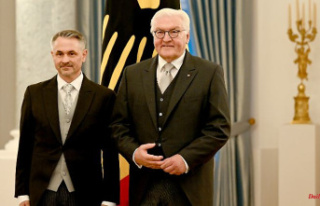After the victory of the CDU in the parliamentary elections in Berlin, SPD leader Lars Klingbeil spoke out against the resignation of the governing mayor Franziska Giffey. In the ARD talk show "Maischberger" on Wednesday evening, he also ruled out that SPD Secretary General Kevin Kühnert governed the city.
After the parliamentary elections in Berlin, the winner of the election, the CDU, will hold initial talks with the SPD and the Greens on Friday. The CDU and its top candidate Kai Wegner clearly won the elections on Sunday. After counting postal votes that turned up later, the Greens and SPD are now jointly in second place. That's not the only reason why the CDU's top candidate has difficult talks ahead of him. Before the elections, Wegner ruled out a coalition with both the SPD and the Greens.
"We don't have to beat about the fact that the election result in Berlin (for the SPD) was not good," admits SPD leader Lars Klingbeil on Wednesday evening on the ARD talk show "Maischberger". The situation in Berlin is now unclear. "We have to see how we get together in Berlin," said Klingbeil. He thinks it is right that the governing mayor, Franziska Giffey, remains responsible. She said she wanted to conduct the exploratory talks for the SPD.
However, the Union sees it completely differently. CDU General Secretary Mario Czaja derives a government claim from his party's election victory. "Decency forbids the SPD from wanting to take on more responsibility," he said shortly after the election in Berlin. One could agree with him: the red-green-red coalition had lost more than five percentage points in Berlin. However, after the 2021 federal election, the then Union top candidate Armin Laschet also made a claim to government for himself and the Union - with a loss of almost nine percent of the vote. There was no question of decency then.
"Giffey says very clearly that the CDU is number one," said Klingbeil at Maischberger. That is why it is right that the CDU is looking for a coalition partner. "It's a completely normal democratic process after elections. Nobody sticks to their post. But you have to make sure that you form a stable government, and that's where the SPD has a duty to have a say," said the SPD leader. However, a stable government does not necessarily have to be based on political majorities. "But what became very clear on election night: the city has to change. We need a change in Berlin." The citizens of the city are angry about the backlog in modernization and about the fact that the traffic turnaround is not progressing.
Klingbeil is angry about individual contributions to the discussion after the parliamentary elections in the capital: "What I don't accept is that there has been talk of election theft in one tone for days now. We really have to be careful. Donald Trump wanted to steal an election, but not this one SPD in Berlin."
Klingbeil addresses articles from several tabloids that had already written in the run-up to the elections in Berlin about an "election theft" by the SPD, which wanted to "take advantage of" the CDU. Stefan Evers, who sits in the House of Representatives for the CDU, asked the question on Twitter: "First the election debacle, then the election theft?"
Should the city end up being governed by a coalition led by the SPD, Franziska Giffey's remaining in the post of governing mayor is not certain. Some newspapers had suspected that SPD General Secretary Kevin Kühnert could take over the office. That's out of the question for Klingbeil: "I need him as Secretary-General," he says clearly.












